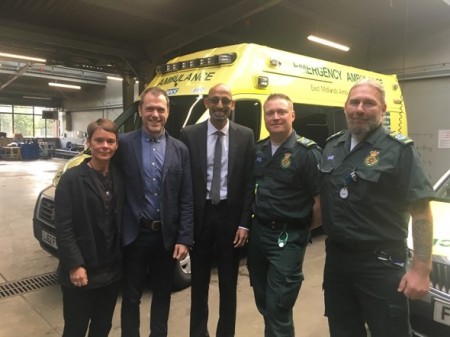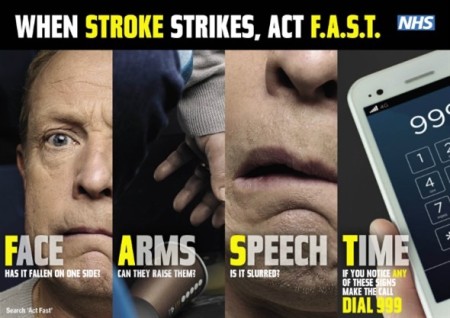A physiotherapist from Nottingham who suffered a severe stroke at home as he was getting ready for work has met the ambulance crew and doctor whose quick actions saved his life.
Rob Goodwin, 49, who is now studying for a PhD at the University of Nottingham, realised something was seriously wrong when he tried to get dressed, fell over in his room and could not move.
His partner Kate Feenan, a former nurse, originally thought he was messing around, but suddenly realised he was having a stroke as his speech was slurred and his face was sloping so she shouted for her daughter Tilly to call 999 for help.
While 999 call handler Kathleen Brabson got Tilly to go through the FAST process to determine how serious the stroke was, Paramedic Dave Snodin and Technician Ted Ismay from Beechdale Ambulance Station rushed to Rob’s home in Kimberley.
Acting fast is vital when someone is suffering a stroke as the sooner they receive medical attention, the better their chances of recovery.
When Dave and Ted arrived, they confirmed he was suffering a stroke and needed treatment as quickly as possible to prevent him from being left with life-changing injuries.
Rob said: “I knew my whole left side was paralysed, but I wasn’t really aware of what was happening.
“Then I looked up and Ted and Dave were there. They were fantastic. They did my observations, put me straight into the ambulance and then took me on blue lights and sirens to the stroke ward at Nottingham City Hospital.”
At the hospital, Doctor Ganesh Subramanian found that Rob had a blood clot in his brain which was causing the stroke, and they hooked him up to the drip which contained clot-busting drugs.
Within 20 minutes, Rob was able to move the left side of his body again, and the next afternoon he walked out of the hospital as though nothing had happened. Now he is back to rock-climbing, cycling and running.
Now Rob is keen to remind people that if they think they or a loved one are having a stroke they need to act FAST and call 999.
Rob said: “If Ted and David hadn’t arrived as quickly as they did, and took me to get treatment straight away, then I would be physically and mentally disabled.
“Instead, I am 99.9% back to normal and able to get on with my life as before.
“I was unbelievably lucky – it could have been a very different story.”

When we attend patients in Nottingham displaying signs of having a stroke, they are admitted directly to the specialist stroke unit at Nottingham City hospital instead of going to the Emergency Department so that they can access the life-saving drugs as quickly as possible.
Patients have their condition assessed using the FAST (Facial, Arm weakness and Speech) test. The FAST protocol is used by paramedics and GPs and is a simple way for them to assess whether a patient is displaying any new neurological changes which indicates they’ve had a stroke. If so, they are taken straight to the specialist stroke unit instead of going to the Emergency Department.
In stroke cases, time is always of the essence as the sooner the patient is given the drugs they need, the better their chances of recovery.
